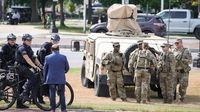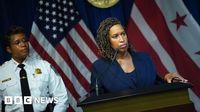On August 14, 2025, the streets of Washington, D.C. became the stage for a dramatic and unprecedented showdown between federal and local authorities, as Attorney General Pam Bondi appointed the head of the Drug Enforcement Administration (DEA), Terry Cole, as the city’s “emergency police commissioner.” This bold move, made under the Trump administration’s continued push to assert federal control over the capital, immediately ignited fierce resistance from D.C. officials and set off a high-stakes legal and political battle that has reverberated across the nation’s capital and beyond.
According to the Associated Press, Bondi’s directive handed Cole “all the powers and duties vested in the District of Columbia Chief of Police,” effectively sidelining the city’s current police chief, Pamela Smith. The order stipulated that the Metropolitan Police Department (MPD) “must receive approval from Commissioner Cole” before issuing any orders. This sweeping assertion of federal authority marked one of the most significant interventions in local governance in modern U.S. history.
The reaction from local leaders was swift and unequivocal. D.C. Attorney General Brian Schwalb declared Bondi’s directive “unlawful,” issuing a memo to Chief Smith that instructed MPD members to continue following orders from the mayor-appointed chief, not those of any federal official. Schwalb’s stance was clear: “It is my opinion that the Bondi Order is unlawful, and that you are not legally obligated to follow it,” he wrote, as reported by The Hill. He quickly escalated the matter by filing a lawsuit in federal court early the next morning, seeking to void Bondi’s order and prevent Cole from assuming any command position within the MPD.
Mayor Muriel Bowser, who was out of town on the day of the announcement, also condemned the federal move. “There is no statute that conveys the District’s personnel authority to a federal official,” Bowser stated on social media, echoing concerns about the erosion of local control. In a subsequent public statement, Bowser described the Trump administration’s actions as “unsettling and unprecedented,” and, according to BBC News, labeled the federal takeover an “authoritarian push.”
The legal basis for the Trump administration’s intervention rested on the 1970s Home Rule Act, which allows the president to use the MPD for “federal purposes” he deems necessary. President Trump, citing a state of emergency and a need to crack down on crime, invoked this authority to justify the federalization of D.C. policing. However, Schwalb and other city officials argued that the law does not permit the federal government to directly alter the MPD’s chain of command or override the city’s personnel decisions.
As the legal battle unfolded, the practical consequences of the takeover became increasingly visible across the city. Hundreds of National Guard troops—800 by official counts—were deployed to key locations, including Union Station and prominent monuments. According to the Pentagon, these troops were tasked with monument security, community safety patrols, and even “beautification efforts.” National Guard Major Micah Maxwell explained that the troops were trained in de-escalation and crowd control tactics and would assist law enforcement in various roles, including traffic control and crowd management. Notably, the White House emphasized that Guard members were not making arrests but were “protecting federal assets, providing a safe environment for law enforcement officers to make arrests, and deterring violent crime with a visible law enforcement presence.”
The visible surge in federal law enforcement did not go unnoticed by residents. Armored vehicles lined up near tourist sites, helicopters from the national park police swept the skies, and DEA agents patrolled popular nightlife areas. The increased presence was striking, especially as volunteers helped about a dozen homeless residents pack up their belongings and leave encampments, sometimes under the watchful eye of law enforcement and with city workers preparing for a scheduled “general cleanup.”
On the night of August 13, just before Bondi’s announcement, federal and local officers set up a checkpoint in a bustling nightlife corridor, resulting in 45 arrests. Of those, 29 individuals were taken into custody for living in the country illegally, while others faced charges related to drug distribution, carrying concealed weapons, and assaulting a federal officer. The White House reported that these actions were part of a broader effort to restore law and order, though the scale and visibility of the operation sparked protests and heightened tensions.
Amidst these developments, Bondi also rescinded several MPD policies, including those that limited inquiries into immigration status and prevented arrests based solely on federal immigration warrants. This effectively aligned the city’s law enforcement practices with the Trump administration’s tough-on-immigration agenda, a move that further inflamed the ongoing dispute between federal and local officials.
The city’s leadership made their opposition clear at every turn. Chief Pamela Smith, in a declaration filed with the court, warned that the federal directive posed a grave threat to public safety and the established command structure. “In my nearly three decades in law enforcement, I have never seen a single government action that would cause a greater threat to law and order than this dangerous directive,” Smith stated in her court filing, as reported by BBC News.
Despite the administration’s claims of rising crime as justification for the intervention, data released by DC police and analyzed by BBC Verify painted a different picture. Violent offenses in the city had actually declined after peaking in 2023, reaching their lowest level in 30 years by 2024. Preliminary figures for 2025 indicated that violent crime had fallen another 26% compared to the previous year, with robbery down 28%. These statistics directly contradicted the administration’s assertions of a public safety emergency.
The MPD, for its part, issued a statement emphasizing its ongoing commitment to public safety and high-quality police service amid the turmoil. “What’s most important for our community to know is that MPD remains committed to delivering high-quality police service and ensuring the safety of everyone in our city,” a spokesperson told NewsNation.
President Trump, meanwhile, indicated plans to request an extension of the 30-day federal takeover from Congress, suggesting that the standoff between federal and local authorities may be far from over. The Justice Department, when contacted by BBC News, declined to comment on the ongoing lawsuit. A hearing before Judge Ana Reyes, appointed by former President Joe Biden, has been scheduled to address the city’s legal challenge.
For Washington’s residents, the days since the federal takeover have been marked by uncertainty, anxiety, and a sense of living through a historic confrontation over the very nature of local self-governance. With armored vehicles on the streets, legal battles in the courts, and city leaders vowing to resist what they see as an overreach by the federal government, the future of policing in the nation’s capital hangs in the balance.



